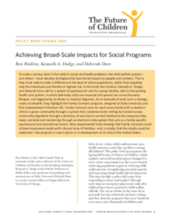Abstract
To make a serious dent in the [US] social and health problems, the child welfare system— and others—must develop strategies that have broad impact on people and contexts. That is, they must seek to make a difference at the level of entire populations, rather than targeting only the individuals and families at highest risk. In this brief from Universal Approaches to Promoting Healthy Development, Ron Haskins, Kenneth A. Dodge, and Deborah Daro call for a system of psychosocial care for young families, akin to the existing health care system, in which well-baby visits are universal and spaced out across the early lifespan, not triggered by an illness or medical diagnosis. As an example of what such a strategy could accomplish, they highlight the Family Connects program, designed at Duke University and first implemented in Durham, NC. Family Connects aims to reach every family with a newborn child in a given community through a system that combines home visiting by trained nurses; community alignment through a directory of services to connect families to the resources they need; and data and monitoring through an electronic data system that acts as a family-specific psychosocial and educational record. After experimental trials showing that Family Connects could achieve impressive results with a broad array of families—and, crucially, that the results could be replicated—the program is now in place or in development at 16 sites in the United States.

